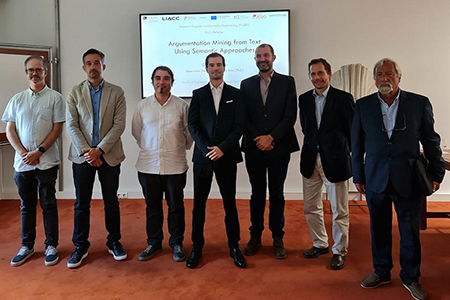Candidate:
Gil Filipe da Rocha
Date, Time and Place
October 2, 14:00, Room Professor Joaquim Sarmento (G129), DEC, FEUP
President of the Jury
Rui Filipe Lima Maranhão de Abreu, PhD, Full Professor, Faculdade de Engenharia, Universidade do Porto
Members
Hugo Ricardo Gonçalo Oliveira, PhD, Associate Professor, Department of Computer Science, Faculdade de Ciências e Tecnologia, Universidade de Coimbra;
Bruno Emanuel da Graça Martins, PhD, Associate Professor, Department of Electrical and Computer Engineering, Instituto Superior Técnico, Universidade de Lisboa;
Eugénio da Costa Oliveira, PhD, Emeritus Professor, Department of Informatics Engineering, Faculdade de Engenharia, Universidade do Porto;
Sérgio Sobral Nunes, PhD, Associate Professor, Department of Informatics Engineering, Faculdade de Engenharia, Universidade do Porto;
Henrique Daniel de Avelar Lopes Cardoso, PhD, Department of Informatics Engineering, Faculdade de Engenharia, Universidade do Porto (Supervisor).
Abstract
“The aim of argumentation mining is to automatically detect, identify and extract arguments from natural language text. The end goal is to provide a structured representation of the arguments (argument diagrams) that can be automated and analyzed in many different ways. Argumentation is a rhetorical act that has been studied for centuries and has been influenced by different research fields such as philosophy, linguistics, computer science, and artificial intelligence. In general, arguments are justifiable positions where pieces of evidence (premises) are offered in support of a claim (conclusion). Some characteristics of natural language text and, more specifically, of argumentation exposition make argumentation mining a complex task. Indeed, the ambiguity of natural language text, the assumption of commonsense reasoning and implicit knowledge, different writing styles, and the inherent complexity of argument diagrams are some of the challenges that argumentation mining systems have to overcome. Addressing these challenges, especially across different languages and text genres, demands robust argumentation mining systems. In this thesis, we conduct research toward the development of a robust computational system that can be employed to detect, identify, and extract argumentative content across different languages and text genres. Our vision is to deploy such a system to address argumentation mining in less-resourced languages (such as Portuguese) and in text genres that feature high-variability of argument exposition profiles (such as opinion articles). To this end, we combine techniques from computational linguistics and machine learning with knowledge from argument structure and rhetoric theories to automatically identify argumentative reasoning in natural language texts. To study argumentation mining in a less-resourced language and a challenging text genre, we conduct an annotation study to create a corpus annotated with arguments from opinion articles written in Portuguese. To address the challenging argumentation mining task, we propose a relation-based approach and context-aware models motivated by argumentation theory foundations and tailored to overcome some of the challenges of argument exposition. To tackle this task in a less-resourced language, we investigate how cross-language learning techniques can be employed to explore annotated resources from different languages and improve the performance of machine learning models in a target language. Finally, to improve the robustness of argumentation mining systems across different genres, we leverage recent advancements in language modeling capabilities and propose a cross-genre approach for argumentation mining.”
